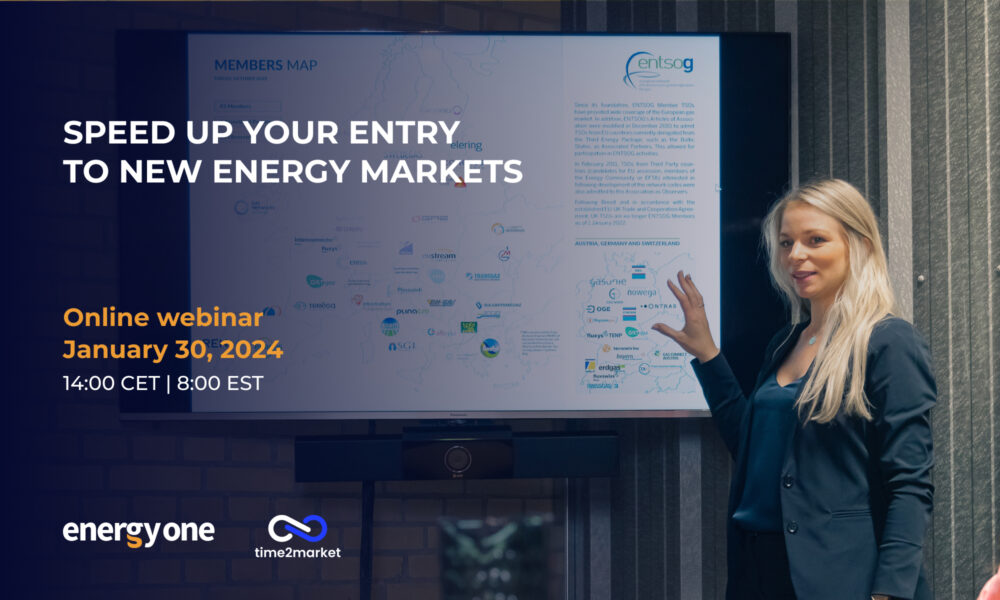On 30 January 2024, Energy One and its partners, Time2Market, presented a webinar on how to speed up your market entry process, where we explored the main challenges encountered when entering new energy markets. You can watch the webinar recording here.
This webinar heralds the kick-off to a series of activity designed to help participants operate effectively in Europe’s fast-changing energy trading markets. Energy One will present several webinars and knowledge sharing opportunities on topics including algo-trading, Energy Trading and Risk Management (ETRM), outsourcing gas and power operations and more, to help new and existing energy trading participants to operate effectively.
Read on for a deep-dive into key challenges and how to overcome them.
How do you enter a new energy market?
Time2Market and Energy One often encounter similar challenges when our clients enter a new energy market in another country or plan to expand their role within a country. If you are already an energy supplier and wish to become a Balancing Responsible Party (BRP) or shipper, or if you want to move from financial trading into the physical side of gas and power trading and shipping, there are several actions involved.
Today, we will highlight three challenges and share tips and tricks on how to navigate cultural differences, communication and barriers to entry for existing BRPs looking to expand to certain other countries.
Additionally, Time2Market has released a supporting article covering three additional challenges, which you can consult here to find out how to navigate the challenges of legalisation and apostiles, finding a trusted legal partners and the time validity of documents.
We realize that there are many differences in how Transmission Systems Operators (TSOs) and market regulators handle things. We’ll be covering general findings here.
Navigating differences in business culture
While energy markets across Europe are becoming more integrated, there are still many cultural differences. You could fill a library with books and essays about conducting business across cultures; from intercultural negotiation styles to books diving into daily routines and habits of people in a different region.
For the sake of brevity we will focus on a few examples relevant for companies looking to expand their energy trading or shipping operations. Looking across the board we can broadly group our experiences with different cultures in two categories:
1. Speed of execution & response time
Challenges of becoming a market participant vary from country to country. Companies need to account for delays and bureaucracy when planning their expansion to new energy markets.
Some of the speediest application processes in Europe are currently seen in Hungary, UK and The Netherlands. We commend these TSOs for their transparency, reasonable response times and availability via different channels, bravo!
We won’t publicly name and shame the TSOs we have less smooth experiences with. Feel free to reach out if you’re looking to enter at a specific market and we’ll share what timelines are realistic based on our experience. A concrete example we have seen is a counterparty stating that documents will be reviewed ‘As Soon As Possible’, where in fact they only replied a month later.
Energy One’s business analysts work with clients to set-up market communication lines between them and the TSO. Because of our experience, we can often estimate how long it usually takes to conduct a successful message test that is acknowledged by a TSO. In short, a simple message test can be completed in a few working days or can last up to several months, depending on company culture/perception of time etc.
2. Getting through to TSOs or other counterparties
This challenge is related to the previous section: if you have difficulty reaching a TSO or counterparty, then it will be harder to become a market participant within your preferred timeline.
While we live in a digital age, a company aiming to expand to new energy markets must prepare for the fact that some counterparties have no phone numbers listed or do not (seem to) monitor their email inboxes. Extra effort to make contact may be required to get access to the people responsible for processing your application.
How can Time2Market and Energy One help?
Our teams have helped over 200 companies enter dozens of new markets over the past fifteen years, so we are familiar with different communication styles. Being in touch with many counterparties for many different clients, we have been able to establish good connections.
Often, we have already established direct lines of communication and Energy One’s business analysts and Time2Market’s market access managers have a few tricks up their sleeves to help you speed up the process as much as possible. Based on our experience, we know who to call or which forms to complete to elicit a response from the counterparty/TSO. One tip is that sometimes we purposefully put a small mistake on a registration form, so that a contact at the TSO reaches out to us for clarification.
During our webinar, we shared many more examples and tips, so do be sure to check the recording!
Communication with counterparties in different languages
How people use language is obviously part of the culture, but it comes up so often we feel it deserves its own section. Companies doing business across the Anglo-Saxon world and beyond are used to English as the lingua franca, however this is not always the case in certain markets.
When looking to expand into energy markets, companies may expect that all documentation will be available in English, however this is far from the truth. Even if a TSO website has an English language version, often some documentation may only be available in the local language.
The same is true for communication via phone or email with local counterparties; the operator may not be able to speak and write English. Sometimes, you may even send an email in English and receive a reply in the local language.
Our experts are at your service!
While a dedicated local consultant is definitely worth considering in some cases, you can also reach out to our teams to see how we can be of assistance. Time2Market currently covers nine languages in-house, and Energy One’s team employs people fluent in seven languages.
As dedicated service providers, we work closely with our customers to help see them through the process of becoming market participants.
Barriers when your ‘BRP’ licence is not recognised in other countries
In some countries, such as Germany, Denmark and The Netherlands, a company that has the status as a ‘Balancing Responsible Party’ (BRP) does not need an additional trader, shipper or supplier licence to operate in that respective energy market. For these countries, the ‘BRP’ status means you have the licence to operate as a market participant and you could trade on the exchange.
However, this may lead to some confusion and delays when BRPs from these countries want to expand to Hungary or The Czech Republic, for example. That is because TSOs in some countries require participants to hold a specific licence (e.g. a ‘trader’ licence) in their home market before a market participant can become a BRP in their market area.
This different licencing regime can lead to significant delays, because one country’s TSO may not recognise the BRP agreement in the ‘home market’ as a licence to trade on that grid. Sometimes, the TSO in a market a BRP wishes to enter considers the applicant’s BRP status in their home market as a contractual agreement between them and their TSO, meaning they do not recognise these BRPs as having a ‘trader licence’ in their home market.
Oftentimes, this sets of a cycle of translating documentation, legalising said documents in the market you want to enter, and worst case it may lead to the TSO having a different interpretation and even denial of entry to said market.
How do we speed things up in this case?
Because Time2Market and Energy One have already assisted several companies, we have different options to make this process smoother. First of all, it is often not our first time setting up in a new market, since we help customers gain market access across most of Europe’s gas and power grids (and beyond!). This means our experts are aware of the dos and don’ts for most regulators. On top of that, we already have good working relationships and lines of communication in place with practically every TSO in the countries we support.
Secondly, we also know which other options are available to gain market access, such as building a new business case, setting up a local legal entity, drafting new documents, or applying for the country-specific trader licences.
Our partners at Time2Market are very skilled at pushing the right buttons and finding things that work. For example, we have requested official statements from Energinet (Denmark’s Power TSO) that our clients are licensed to trade on the Danish Grid due to their status as BRP, even though Energinet does not require a BRP to hold a ‘trader licence’. Furthermore Time2Market reached out to the Danish Energy Regulatory Authority to support the Energinet statement. In the end this helped take away any doubts for the TSO of the market the client wanted to expand to. This is just one example of the tenacity and ingenuity of Time2Market’s market access managers.
Want to learn more?
You can read about three additional challenges and how to navigate them in a supporting article by Time2Market, where they talk about legalisation, finding a good legal representative and the time validity of documents.
Found our article interesting? Want to hear from our experts live? We warmly invite you to watch a recording of our free webinar and Q&A, where Eszter Pontenagel, CEO of Time2Market, and Mitch Exon, Sales Manager at Energy One, shared a wealth of useful insights, tips and tricks that may help you speed up your market entry process.


